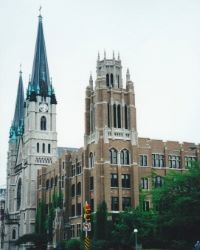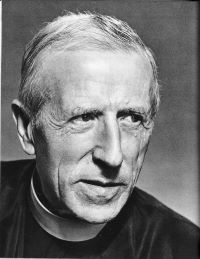| The Professions and Service | |||||||
|
Introduction Renaissances Science and Progress The Professions and Service Index by Topic Historical Timeline Return to Main Page |
The Twentieth Century The twentieth century ushered in an unprecedented explosion of knowledge, especially in the sciences and technology. A large number of new disciplines appeared, many requiring extensive training, and placing a significant burden on colleges and universities. Related to this was a movement to eliminate many of the traditional core requirements, often replaced with an assortment of elective courses: "as required courses were dropped and elective courses of study became even more directly tied to occupational interests, the idea of acquaintance with a fixed body of knowledge, classical or otherwise, as a mark of the educated person began to disappear."[3] As implied in this statement, a casualty of this process was the notion of a common heritage of knowledge, that had helped to define the essence of Western civilization. The growing complexity of professional education and the emphasis on electives made core courses and courses on moral philosophy or ethics increasingly rare at colleges as the century developed. The result of all this was that after being trained in their professions, individuals often knew more facts, but perhaps knew less about the topics that provide values and purpose.
Vocations and Professionalism As each individual finds a role in the world, a vocation or profession, some are called through obvious superior skills or through strong interests, but others are placed more by circumstances, and skills are developed from necessity, to fulfill some pressing need.[6] All of these are calls to service. When the execution and development of a skill is seen as service, it has the most serious moral dimension. Samuel Florman, a professional engineer who has written extensively on the engineering profession, reflects on this dimension: “There are religious implications in technology- a little bit of cathedral in everything we build." [7] Human creations have a reality of their own outside of their creator, but the created object carries in it the imprint of its creator as a projection of the mind that created it. The individual puts a part of himself into the result of his work. This creation always has an inherent element of generosity, since it can be used by others for their benefit. The created object or service would not exist if this effort had not been made, and it provides some usefulness to someone in the world, even though often the creator neither sees nor knows who benefits from it.[8] A professional can do a mediocre job or he or she can do it to the fullest extent of his or her ability. To the extent that the work is perfect, the individual has made the fullest creation, has added the most to the collective human reality. This perfection is a measure of his or her love for others and his or her care. Quoting Samuel Florman again: “The quest for excellence is a virtuous enterprise that needs no rationalizing."[9]
But Teilhard hoped that humanity would act in concert in what he called the collective work of the universe: "Because we love, and in order that we may love even more, we find ourselves happily and especially compelled to participate in all the endeavors, all the anxieties, all the aspirations and all the affections of the earth..."[12] [1] Washington Gladden, Commencement Days (New York: The Macmillan Co., 1916), 31. [2] Richard Ely, Social Aspects of Christianity (New York: Thomas Y. Crowell & Co. ,1989), 16. [3] Christopher J. Lucas, American Higher Education: A History (New York: Palgrave Macmillan, 2006), 176. [4] John Bascom, Sermons and Addresses (New York: Putnam's Sons, 1913), 189-196. [5] Washington Gladden, Commencement Days, 11-12 [6] John Donohue, S.J., Work and Education, (Chicago: Loyola University Press, 1959), 190. [7] Samuel C. Florman, The Civilized Engineer (New York: St. Martin’s Press, 1987), 20. [8] John W. Donohue, S.J., Work and Education, 150, 164. [9] Samuel C. Florman, The Civilized Engineer, 70. [10] Pierre Teilhard de Chardin, Letters From a Traveler (New York: Harper and Row, 1962), 164. [11] Pierre Teilhard the Chardin, "The Formation of the Noosphere" in The Future of Man, 179-180. [12] Pierre Teilhard de Chardin, "The New Spirit," in The Future of Man (New York: Harper and Row, 1964), 99. |
||||||

 Marquette University
Marquette University